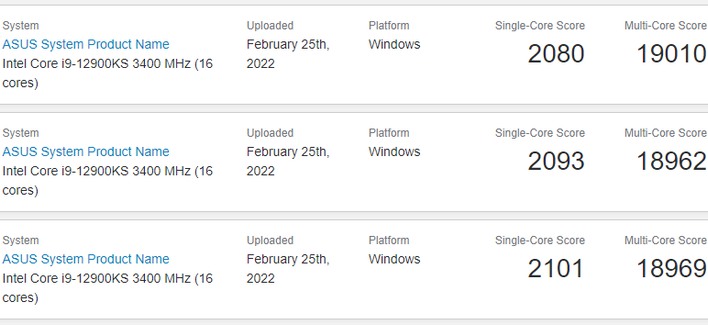Leaked Intel Core i9-12900KS 5.5GHz Benchmark Foreshadows Significant Performance Lift
Intel's head had grown heavy with the weight of its long-held crown, and AMD snatched it away with the release of its Zen 3-based Ryzen 5000 processors. Intel took it back right after, of course, but AMD's as-yet-unreleased Ryzen 7 5800X3D might make another grab for the top spot on the charts.
Perhaps to preempt that release, Intel announced the Core i9-12900KS back at CES 2022. This processor is functionally identical to the Core i9-12900K that we reviewed back at the start of last November, just with a healthy juice to its clock rate. According to Intel, the chip tops out at 5.5 GHz, and it will do 5.2 GHz on all eight of its Golden Cove P-cores simultaneously.

Whoever was running the benchmarks did their testing using an ASUS ROG STRIX Z690-F GAMING motherboard and 32GB of DDR5 memory running at 4800 MT/s. The relatively modest memory speed could be why the 12900KS "only" scores 2101 for its highest single-core score and 19010 for its highest multi-core score.
Based on our own testing, we got a single-threaded score of 2004 and a multi-threaded score of 18534 for the Core i9-12900K. Comparing those numbers to the leaked benchmarks for the Core i9-12900KS, we come out to a 5% gain in single-threaded performance and about 3.5% gain in multi-threaded performance.

As a single example, the result above scores higher on both single- and multi-threaded tests despite running at a lower CPU clock rate. We'd reckon that system's ultra-fast DDR5-6200 memory probably has something to do with that. Other interesting results include this Core i5-12600K result (2096 ST!) and this bus-overclocked Core i5-12400.
We already knew that the Core i9-12900KS is functionally an overclocked Core i9-12900K—the only difference is the increased clock speed. As a benchmark, Geekbench is pretty sensitive to memory and bus speed, so it may not be the best representation for the benefits of a pure CPU clock bump like you get with the Core i9-12900KS. We'll have to see how games respond to the extra speed when it hits the market in the not too distant future.


